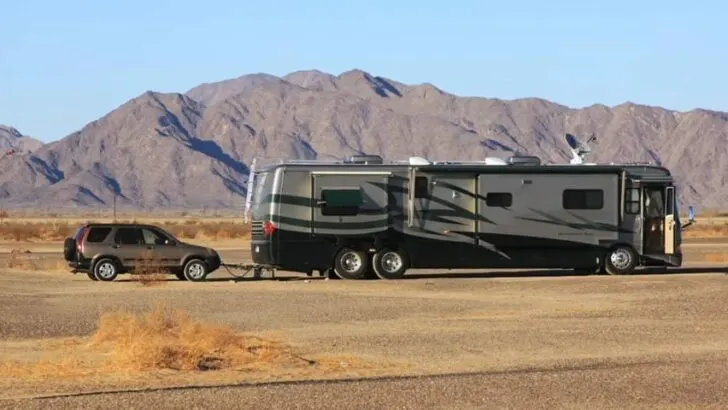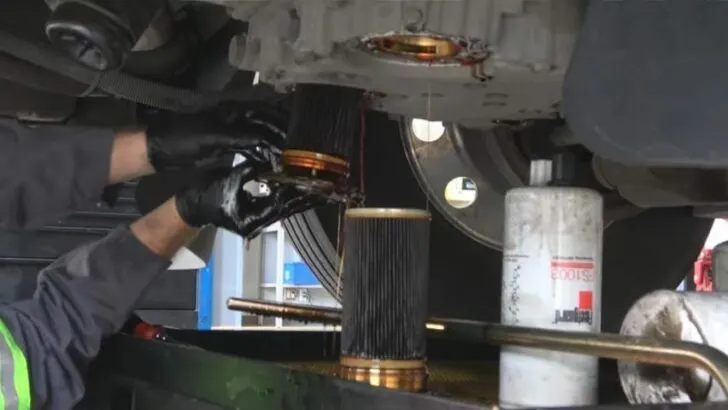We’ve lived, worked, and traveled in a diesel pusher that we’ve driven all over the United States, Canada, and even into Mexico for nearly two decades. But we’ve driven a gas-powered motorhome now and again as well, so we’ve got some experience to put behind any comparisons we make relative to the pros and cons of each.
With that said, there are some significant differences between gas and diesel powered motorhomes, and one of the questions we’ve often heard asked is whether gas motorhomes lack power by comparison. So, today we’re looking at that question and breaking down the answer, perhaps with a few surprises in store.
Are Gas Powered Motorhomes Powerful?
The short answer is that gas-powered motorhomes are sufficiently powerful, but in a different way than diesel-powered motorhomes. We’ve heard it said that a gas-powered engine is like a racehorse (i.e., they get started from a stop faster), and a diesel-powered engine is like a workhorse (i.e., they can pull a lot of weight, just slower). That’s a fair analogy, but there are a lot of important details within that comparison.
The most often-quoted measurements of the output of an engine are horsepower and torque:
- Torque is a measurement of the amount of twisting force the engine can supply to the driveline and indicates the engine’s ability to do work (for instance, higher torque numbers mean the engine can move larger loads)
- Horsepower is a measurement of the power output of the engine and is an indicator of how rapidly an engine can perform that work (horsepower actually equals torque x RPM)
For the same size, a gasoline-powered engine will produce more horsepower and less torque. As a result, it will be faster to accelerate, but it can’t push as much weight and/or maintain that speed when climbing steep hills.
The diesel engine will produce significantly more torque, especially at lower RPMs. That gives it an advantage with moving larger, heavier loads from a standstill but won’t accelerate as quickly as its gas-powered counterpart. And, because of the larger amount of torque available at lower RPMs, the diesel engine will be better able to maintain your RV’s speed as the incline increases (up hills)!
Gas-powered engines run at higher RPM (revolutions per minute – a measure of how fast the engine is spinning), which is what enables them to produce more power (horsepower) from their lower torque output. But it’s important to remember that the higher the RPM, the more air and fuel the engine is burning. So, for gas-powered motorhome owners, this translates into greater fuel consumption.
Let’s take a look at some of the other differences between diesel- and gas-powered motorhomes so that you can apply the stats to your own intended motorhome usage, enabling you to determine which is preferable for your particular situation.
What are the Differences Between Diesel and Gas Motorhomes?
While there are many differences between diesel and gas motorhomes, let’s focus on the top four considerations for most motorhome owners.
Price
The upfront price of a diesel-powered motorhome is higher than that of a gas-powered motorhome. There’s no getting around this. Most diesel pushers, for example, are high-end luxury coaches, meaning that everything about the motorhome and its contents is more expensive.

A diesel pusher is a high-end home-on-wheels with a price tag to reflect its luxuries.
Maintenance costs also tend to be higher with a diesel pusher, though some would argue that diesel engines require less maintenance and repair over time.
In addition to the upfront cost, people often point out that diesel fuel costs more than gasoline at the pump in most places, but this is a bit of a misconception based on a shortsighted view of the overall situation.
While diesel fuel does usually cost more per gallon than gasoline, diesel fuel contains more usable energy. This means that less diesel is consumed to do the same amount of work (remember the workhorse analogy)! So, overall fuel costs for diesel -vs.- gasoline engines tend to even out in the long run since diesel offers better fuel economy due to its energy density and efficiency.
Longevity
Diesel-powered motorhomes take the lead in terms of longevity, without question.
Going back to the fact that gas engines run at higher RPM than diesel, there is also more strain on a gasoline engine. Diesel engines, by comparison, run under far less strain and thus tend to run for hundreds of thousands of miles. (This is one of the reasons why trucking companies run trucks with diesel engines.)
Also, diesel engines are designed to be more rugged & durable and tend to run far longer than gas engines without requiring major repairs or replacement. When a diesel engine does require repairs, however, the cost of the repairs can be substantial because they’re more technologically advanced. With proper maintenance, though, the average diesel engine has far greater longevity than the average gas engine… and the average motorhome!
Torque
A diesel engine offers greater torque to the driveshaft than a gasoline engine does. For this reason, diesel-powered motorhomes can tow far more weight than those that are gas powered, with the diesel engine continuing to offer better fuel economy.
So, a gas-powered motorhome might have a towing capacity of 5,000 pounds, whereas a similarly-sized diesel-powered motorhome might tow 10-15,000 pounds. The difference is significant.

Towing thousands of pounds while climbing mountains is something a diesel-powered rig handles well. But, unfortunately, a gas-powered engine would be far less capable in this scenario.
The increase in torque also means that a rig with a diesel-powered engine will have more power climbing hills and will be better able to maintain speed as it climbs.
Resale Value
The durability and longevity of the engines of diesel-powered motorhomes are major contributors to the high resale value of these rigs. The average gas-powered rig will have surely seen the best of its lifetime at anywhere between 150,000 and 200,000 miles, while there are diesel-powered rigs still running strong with twice as many miles on the clock, or far more. So it wouldn’t be unusual to see a well-maintained diesel-powered RV boasting 400,000 or more miles, still on the road and being enjoyed (assuming that the RV manufacturer put as high-quality & durable materials into the construction of the house as the chassis & engine manufacturers did).
In addition, the high-end furnishings and amenities of diesel-powered rigs endure over time and command higher prices in the used motorhome market. So while a buyer pays significantly more upfront for a diesel-powered motorhome, that investment pays off with significant longevity and higher resale value.
We’re writing this in 2021 onboard our 2005 Newmar diesel pusher, our second motorhome. Even though we’ve lived and traveled full time in this rig for more than 16 years, our rig could pass for nearly new, mechanically, aesthetically, and in terms of performance.
Advantages of a Gas Engine RV
Having noted that some of the differences between gas and diesel motorhomes highlight the advantages of diesel-powered rigs, we’d be remiss were didn’t also consider some clear advantages of gas powered motorhomes.
Let’s take a look at some of the top reasons why a buyer might prefer to own a gas engine RV.
Availability and Cost of Fuel
Not every gas station carries diesel fuel! Depending on where you’re traveling, diesel fuel may not be as readily available, but you can purchase gasoline everywhere.

While there are gas stations in nearly every town, not every station offers diesel fuel.
But when you do arrive at a station that sells both gasoline and diesel, you’ll usually pay more per gallon of diesel fuel than you will per gallon of gasoline, depending on location and market conditions (and also what grade of gasoline a particular rig uses). For example, according to the U.S. Energy Information Administration, Gasoline and Diesel Fuel Update, as of July 26, 2021, the average cost of a gallon of regular gasoline was $3.14, and the average cost of a gallon of diesel fuel was $3.34. But it does vary, and some areas do have diesel fuel at lower prices than regular gas.
A diesel engine is about 25% more fuel-efficient than a gasoline engine, but when you’re fueling up, you’ll still feel the pinch. With a 20-cent per gallon difference, that’s an extra $20 for every hundred gallons of fuel pumped into your rig. Depending on where in the country you’re filling up, you’ll find a larger or smaller discrepancy in price, but in most places you go, you’ll pay more for diesel than you will for regular gasoline.
Easier Maintenance
There’s no getting around the fact that a gasoline engine is a less complicated beast. Diesel engines are more technologically advanced as a rule, and therefore more complex in their designs.
We’d argue that overall maintenance costs are lower for diesel-powered engines because they have fewer problems than gas-powered engines tend to have over their lifetime. However, when a diesel engine does require maintenance or repair, the cost can be far more substantial.
While diesel engines don’t require spark plugs or distributors, they need regular maintenance to keep them running well and trouble-free. The oil needs to be changed regularly as well as the air, fuel, and oil filters. These are more expensive upfront, but if this maintenance is neglected, resulting in eventual damage, you’re going to be paying a diesel mechanic a whole lot of money to resolve the issues.

Regular maintenance is critical to the health and longevity of a diesel engine. A well-maintained diesel powered engine can easily run for 400,000 miles or more.
Parts and labor are also more expensive for diesel engine repairs. This, along with the higher cost of replacing a diesel rig, means that insurance premiums can be higher as well.
More Resistance to Cold Weather
Diesel engines don’t have spark plugs, so they require higher pressure and temperatures to ignite the fuel. For this reason, they’re harder to start in freezing weather. It’s even possible for diesel fuel to gel if the temperature drops far enough below freezing. This can occur because diesel fuel contains paraffin wax as an aid to viscosity and lubrication, and freezing temperatures thicken paraffin wax.
There are ways for diesel-powered motorhome owners to deal with this potential, including using additives, heated storage in winter, utilizing a block heater, or doing what we usually do — snowbird to warm weather in the winter!

We’ve spent several winters in the show. To start a diesel engine in this kind of weather requires a block heater.
Temperatures need to drop below 32 degrees Fahrenheit before diesel really begins to feel the impact. Because we usually snowbird in the winter, we rarely find ourselves in temperatures this low. For those who regularly RV in frigid weather, a winter diesel fuel additive is an effective (and popular) way to deal with cold winter temperatures. We prefer to head South!
Higher RPM
Gas engines have higher RPM (revolutions per minute) than diesel engines. This is by design. Because gas engines rev higher than diesel engines, they’re usually capable of accelerating faster (although that’s not an absolute, especially if a gas rig is too heavily loaded).
So, while diesel engines deliver more torque (at lower RPM), gas engines deliver more horsepower. Therefore, if you intend to drive your rig around town a lot, requiring lots of quick starts, and you don’t intend to tow anything with your rig, a gas-powered motorhome may work best for you.
It takes pretty high compression to ignite diesel fuel, so a diesel engine creates its torque and power at a much lower RPM. A gas engine, on the other hand, is capable of higher RPM and thus more horsepower.
Who Would Benefit from Driving a Gas Powered Motorhome?
Gas-powered motorhomes work best for folks who tend to travel in flatter areas rather than in the mountains, who don’t put a lot of miles on their RV, and who don’t need to tow heavy loads (especially up mountains).
A buyer who isn’t going to put a lot of miles on their rig, who’s unlikely to keep their RV past 100,000 miles or so, and who isn’t planning to tow a heavy load might appreciate quicker acceleration in traffic, easier starting in cold weather, and the ability to find fuel on virtually every corner.
Finally, budget is always a serious consideration with any purchase, especially a sizable purchase like that of a motorhome. The upfront cost of purchasing a diesel pusher is almost always higher than that of a gas-powered motorhome. This is likely to be a significant consideration for most buyers.
Conclusion
The answer to the original question of this post, “Do gas powered motorhomes lack power?” is generally no, unless you intend to drive up mountain passes or tow hefty loads.
The answer to whether you’re better off with a gas-powered or diesel-powered motorhome depends entirely on how you intend to use your RV. These are questions only you can answer based on your travel intentions.

We don’t like our travel adventures to be restricted, so we opted for a diesel pusher with sufficient power and torque to carry us to places like this.
Because we’re adventurous travelers, live in our motorhome full time, want to reduce limitations on where we can travel (i.e., up steep mountain passes), how much we can carry & tow (i.e., a basement full of our junk + an SUV), or how many trouble-free miles we can amass over a couple of decades or more, the best choice for us was a diesel pusher.
But your mileage may vary. (See what we did there?)
Geek Out with Us Every Week
Join our newsletter to learn about all things RV-related. Every week we offer free tips, tricks, product reviews, and more to our online community of RVers. So whether this is your first time on the road or you’re a seasoned expert, we’d love for you to geek out with us!


Drew Haiman
Friday 20th of August 2021
Another thing to consider is that diesel RVs have diesel generators, which are quieter and more efficient than gas generators.
TheRVgeeks
Friday 20th of August 2021
Good point, Drew.
Rich Rogers
Monday 9th of August 2021
Our 2021 gas Wonder class C challenges some of the diesel vs gas choice data. With the Ford 3.5L Eco-Boost V6 Gas (310 hp/400 ft-lbs Torque) c/w 10 speed transmission. Great acceleration, even going up hills pulling a trailer (3,300#) Decent gas mileage for an 11,000# class C. Quiet and fun to drive.
TheRVgeeks
Monday 9th of August 2021
Hey Rich. Leisure makes a wonderful RV... so glad to hear about your experience with it.
WILLIAM COOLEY
Saturday 7th of August 2021
Hi guys, you made me look twice at the picture of the filters. The fuel/water separator is upside down. But it isn't installed.???? The picture show's them changing the transmission filters. Great article, keep up the good work. In Freeport Main for anouther week.
TheRVgeeks
Saturday 7th of August 2021
Just keeping you on your toes, William! LOL Enjoy your time in one of our favorite states (have some lobster for us)!
John Schretlen
Saturday 7th of August 2021
This is another of your 'should read before buying' posts for those looking to get into the RV lifestyle. Are you keeping a list?
I have a 45' DB and keep very good track of fuel costs and performance. In fact I log every fuel stop in detail.
One question people always ask is how many miles-per-gallon I get. But also important is the cost per hour as that will take into consideration both the route (Kansas flat or Colorado Rocky Mountain), the driving style/speed plus the cost of fuel. I have fueled up as cheap as $21 per hour for the last tank and as high as $43 per hour. (yikes!).
Yes, when pushing my big rig up the big hills that ol' 650 HP Cummins works real hard, and I pay for it. Especially when I have the great fortune to start a trip when world events cause a huge jump in fuel prices.
P.S. As of today my overall average cost for fuel is $30.26 per hour of engine time.
TheRVgeeks
Saturday 7th of August 2021
Love it! This kind of analysis reminds us that you're a retired pilot, John!
tommyO
Saturday 7th of August 2021
Hello all !! LOVE THE RV GEEKS posts and videos. Ok ...
Well now, WE (the boss and I) have had three coaches. A Thor and a Fleetwood (gassers) and currently have an 08 Newmar DSDP ( because of pre DEF ;-]] ) I agree with everything being said in the posts since I have experienced it all.
The bottom line....LOVE the diesel...will never go back to gas.
Is that YOU Dave?? Densmore retired WO???
TheRVgeeks
Saturday 7th of August 2021
Hey Tommy! Always great to hear from a fellow (satisfied) Newmar owner! Pre-Def. Yeah!